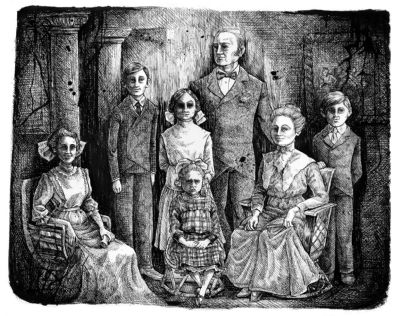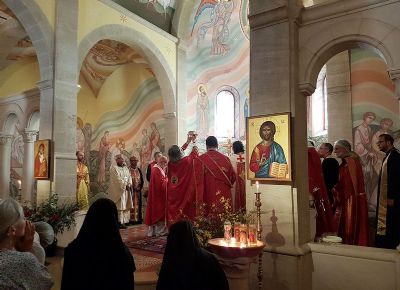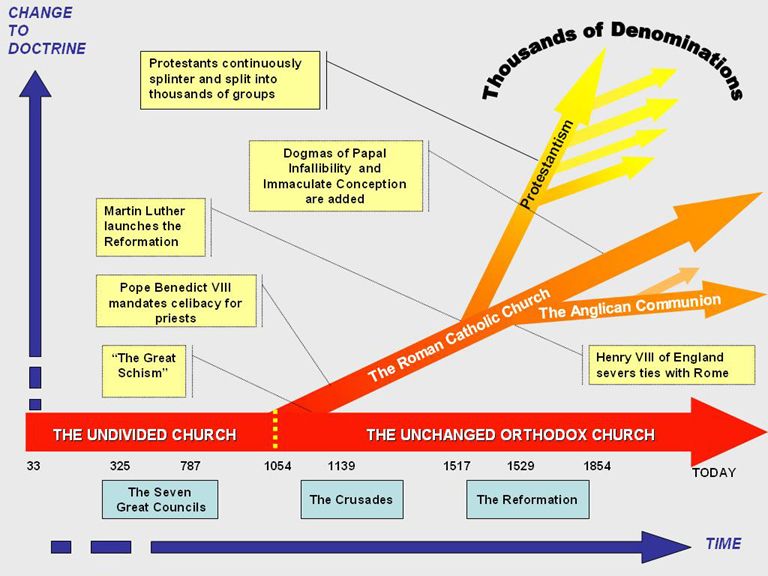Part I – An Introduction to Holy Tradition
Holy Tradition – An Introduction

What comes to mind when you hear the word tradition? What does it mean to be traditional? Perhaps you might think of being stuck in the past, resistant to change, and lacking positive growth and the opportunity to do good things due to clinging to old-fashioned ideas.
Well, that’s one sense of the word. In fact, the Saviour warns us against this kind of slavish following of human traditions. When He was performing his public ministry – preaching, feeding the hungry, healing the sick, and doing other good deeds – many people began to follow Him.
The Pharisees (strict followers of the letter of the Law of Moses) overlooked all of these good deeds and instead decided to criticise the Saviour because some of his hungry followers were eating without first performing the ritual washing required by the Law. Here’s what He had to say to them:
‘How well Isaiah described you when he prophesied about you hypocrites, as it is written:
“This people honours Me with their lips, but their heart is far away from me.So they worship Me in vain, teaching the doctrines and laws of men.”
For while abandoning the commandment of God, you cling to the tradition of men, such as washings of pots and cups. And you are doing many other similar things of this kind.’ And He went on to say, ‘How well you reject the commandment of God in order to keep your tradition.’
– Mark 7: 6-9
Harsh words indeed! And rightly so. When we allow the letter of the law to prevent us from keeping the spirit of the law and helping those in need, something has gone very wrong indeed.
But is tradition always a negative word? Let’s look at what it actually means.
The English word tradition comes from the Latin verb traditere. The Greek word in the Bible which means the same thing is paradosis. Both words literally mean “to pass on” or “to hand over”.

Every family has its traditions – those things that form us into who we are and become part of our common identity. Our parents might teach us to say “please”, “thank you”, and “excuse me”, and not to interrupt, as well as passing on other good manners and values. Perhaps we might have a meal together once a week, go to church together, and open presents on Christmas morning. We might tell stories as we reminisce over shared memories from family holidays or loss of loved ones. We might enjoy listening to the same stories told by grandparents of how things used to be. The whole collection of these experiences forms our family tradition, which will be passed on the to next generation.

In the the family of the Church, when we talk about our tradition, which we call Holy or Sacred Tradition, we’re talking about the whole life of the Church – that entire body of writings, practices, worship, beliefs, and ways of being that makes us the Church.
Why? Well, everything we know, everything we believe, everything we do, the way we worship and pray, and most importantly the way we relate to God, has been handed down to us – has been traditioned to us – from those who went before. Those who learnt from the Apostles continued in the way of life they had received, and passed it on to those who came after them, from one generation of Christians to the next, down to our own day.
Without Holy Tradition, we would have nothing – no Bible, no prayers, no hymns, no worship, no knowledge of how God reaches out to his people, no way of knowing how we can reach out and meet Him, and ultimately, no salvation. The Birth, Life, Death, Resurrection, and Ascension of Jesus would be completely unknown to us.
Yet, because of Holy Tradition, we are able to continue in our own times in the same Christian life as those who went before us, and who went before them, and so forth, all the way back to Christ’s Apostles and the early Church. So, the Church’s Tradition isn’t something old-fashioned and stagnant but rather it is the ongoing and continued experience of the Church – its life-blood – which is passed on afresh from one generation to the next.
Writing to his flock in Thessaloniki, where he had done plenty of missionary work and gained many followers for Christ, St Paul wrote the following caution to the early Christians there:
‘Now we command you, brethren, in the Name of our Lord Jesus Christ, to withdraw yourselves from every brother or sister who walks in rebellion, and not after the tradition which they received from us.‘
– 2nd Thessalonians 3: 6
From this, it is clear to us that, even in the time of St Paul, there were groups that had broken away from the Church by replacing the Apostolic Tradition with their own beliefs and customs. Sadly, this has continued down to our own day. We look at history and we see that, over the centuries, many groups have separated themselves from the Church over this or that change to their teachings and practices, so that today there are many thousands of groups which are the descendants of those who originally broke away. Their adherents are often very sincere in seeking to follow Christ, but while they use the name Christian, many of them have forgotten the Christian Tradition: it has not been handed down to them by those who went before them, at least not fully.
In our age of relativism and religious pluralism, it is often unpopular to state that one belief is correct and the other is incorrect. We know that when this has been taken to its extreme, people have been hurt and even killed over religious disputes. However, it is important for us to remember that it is possible for us to understand a belief or an opinion to be wrong while still respecting and even defending people’s right to hold that belief. The lessons of the past and the message of the Gospel must teach us not to impose our beliefs by force and to respect the free will that God has granted to humankind. At the same time, we must not allow our desire to avoid the mistakes of the past to become an excuse to give legitimacy to false teachings and dilute the truths revealed by God,

This is why holding fast to the Sacred Tradition of the Church is so important to Orthodox Christians. That is not to say that we are inflexible or closed to new thoughts but rather that, when we are faced with new situations and new questions – advances in medicine, developments in the scientific understanding of the world around us, and even the possibility of life on other planets – we embrace them as opportunities to learn more about our faith and try to understand these new scenarios in the light of Tradition, with the guidance of the Holy Spirit.
This way, when, for the sake of our salvation. we ask ourselves the important question, ‘If a group of 1st-century followers of Christ who were taught directly by the Apostles, were to be transported through time to our own day, would they recognise us as being the same Church?’ we may know with confidence that the answer is yes.
‘Therefore, brethren, stand fast and hold the traditions which you were taught, whether by word or our epistle. Now may our Lord Jesus Christ Himself, and our God and Father, who has loved us and given us everlasting consolation and good hope by grace, comfort your hearts and establish you in every good word and work.’
– 2nd Thessalonians 2: 15-16
Let us explore in more detail the various elements of the Church’s Tradition.


